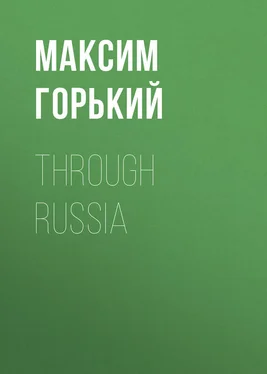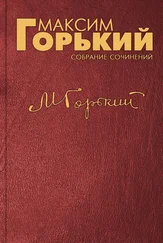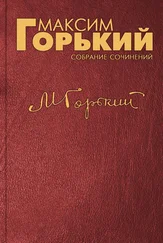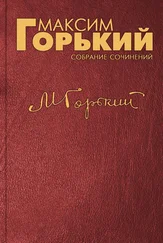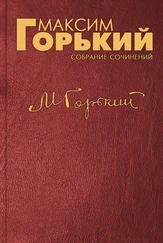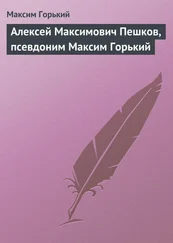Максим Горький - Through Russia
Здесь есть возможность читать онлайн «Максим Горький - Through Russia» — ознакомительный отрывок электронной книги совершенно бесплатно, а после прочтения отрывка купить полную версию. В некоторых случаях можно слушать аудио, скачать через торрент в формате fb2 и присутствует краткое содержание. Жанр: Русская классическая проза, Классическая проза, на английском языке. Описание произведения, (предисловие) а так же отзывы посетителей доступны на портале библиотеки ЛибКат.
- Название:Through Russia
- Автор:
- Жанр:
- Год:неизвестен
- ISBN:нет данных
- Рейтинг книги:3 / 5. Голосов: 1
-
Избранное:Добавить в избранное
- Отзывы:
-
Ваша оценка:
- 60
- 1
- 2
- 3
- 4
- 5
Through Russia: краткое содержание, описание и аннотация
Предлагаем к чтению аннотацию, описание, краткое содержание или предисловие (зависит от того, что написал сам автор книги «Through Russia»). Если вы не нашли необходимую информацию о книге — напишите в комментариях, мы постараемся отыскать её.
Through Russia — читать онлайн ознакомительный отрывок
Ниже представлен текст книги, разбитый по страницам. Система сохранения места последней прочитанной страницы, позволяет с удобством читать онлайн бесплатно книгу «Through Russia», без необходимости каждый раз заново искать на чём Вы остановились. Поставьте закладку, и сможете в любой момент перейти на страницу, на которой закончили чтение.
Интервал:
Закладка:
Ossip stroked his beard awhile, and pondered. Then he seated himself beside me, and said in an undertone:
"That is true."
"Well?"
"But things are always so. The truth is that it's time you departed. What sort of a watchman, of a checker, are you? In jobs of this kind what a man needs to know is the meaning of property. He needs to have in him the spirit of a dog, so that he shall look after his master's stuff as he would look after the skin which his mother has put on to his own body. But you, you young puppy, haven't the slightest notion of what property means. In fact, were anyone to go and tell Vasili Sergeitch about the way in which you keep letting us off, he'd give it you in the neck. Yes, you're no good to him at all, but just an expense: whereas when a man serves a master he ought, do you understand, to be PROFITABLE to that master."
He rolled and handed me a cigarette.
"Smoke this," said he, "and perhaps it'll make your brain work easier. If only you had been of a less awkward, uncomfortable nature, I should have said to you, 'Go and join the priests; but, as things are, you aren't the right sort for that – you're too stiff and unbending, and would never make headway even with an abbot. No, you're not the sort to play cards with. A monk is like a jackdaw – he chatters without knowing what he is chattering about, and pays no heed to the root of things, so busy is he with stuffing himself full with the grain. I say this to you with absolute earnestness, for I perceive you to be strange to our ways – a cuckoo that has blundered into the wrong nest."
And, doffing his cap, a gesture which he never failed to execute when he had something particularly important to say, he added humbly and sonorously as he glanced at the grey firmament:
"In the sight of the Lord our ways are the ways of thieves, and such as will never gain of Him salvation."
"And that is true enough," responded Mokei Budirin after the fashion of a clarionet.
From that time forth, Ossip of the curly, silvered head, bright eyes, and shadowy soul became an object of agreeable interest for me. Indeed, there grew up between us a species of friendship, even though I could see that a civil bearing towards me in public was a thing that it hurt him to maintain. At all events, in the presence of others he avoided my glance, and his eyes, clear, unsullied, and fight blue in tint, wavered unsteadily, and his lips twitched and assumed an artificially unpleasant expression, while he uttered some such speech as:
"Hi, you Makarei, see that you keep your eyes open, and cam your pay, or that pig of a soldier will be making away with more nails!"
But at other times, when we were alone together, he would speak to me kindly and instructively, while his eyes would dance and gleam with a faint, grave, knowing smile, and dart blue rays direct into mine, while for my part, as I listened to his words, I took every one of them to be absolutely true and balanced, despite their strange delivery.
"A man's duty consists in being good," I remarked on one occasion.
"Yes, of course," assented Ossip, though the next moment he veiled his eyes with a smile, and added in an undertone: "But what do you understand by the term 'good'? In my opinion, unless virtue be to their advantage, folk spit upon that 'goodness,' that 'honourableness,' of yours. Hence, the better plan is to pay folk court, and be civil to them, and flatter and cajole every mother's son of them. Yes, do that, and your 'goodness' will have a chance of bringing you in some return. Not that I do not say that to be 'good,' to be able to look your own ugly jowl in the face in a mirror, is pleasant enough; but, as I see the matter, it is all one to other people whether you be a cardsharper or a priest so long as you're polite, and let down your neighbours lightly. That's what they want."
For my part I never, at that period, grew weary of watching my fellows, for it was my constant idea that some day one of them would be able to raise me to a higher level, and to bring me to an understanding of this unintelligible and complicated existence of ours. Hence I kept asking myself the restless, the importunate question:
"What precisely is the human soul?"
Certain souls, I thought, existed which seemed like balls of copper, for, solid and immovable, they reflected things from their own point of view alone, in a dull and irregular and distorted fashion. And souls, I thought, existed which seemed as flat as mirrors, and, for all intents and purposes, had no existence at all.
And in every case the human soul seemed formless, like a cloud, and as murkily mutable as an imitation opal, a thing which altered according to the colour of what adjoined it.
Only as regarded the soul of the intelligent Ossip was I absolutely at a loss, absolutely unable to reach a conclusion.
Pondering these and similar matters in my mind, I, on the day of which I speak, stood gazing at the river, and at the town under the hill, as I listened to the bells. Rearing themselves aloft like the organ pipes in my favourite Polish-Roman Catholic church, the steeples of the town had their crosses dimly sparkling as though the latter had been stars imprisoned in a murky sky. Yet it was as though those stars hoped eventually to ascend into the purer firmament above the wind-torn clouds that they sparkled; and as I stood watching the clouds glide onward, and momentarily efface with their shadows, the town's multifarious hues, I marked the fact that although, whenever dark-blue cavities in their substance permitted the beams of the sun to illuminate the buildings below, those buildings' roofs assumed tints of increased cheerfulness. The clouds seemed to glide the faster to veil the beams, while the humid shadows grew more opaque – and the scene darkened as though only for a moment had it assumed a semblance of joy.
The buildings of the town (looking like heaps of muddy snow), the black, naked earth around those buildings, the trees in the gardens, the hummocks of piled-up soil, the dull grey glimmer of the window panes of the houses – all these things reminded me of winter, even though the misty breath of the northern spring was beginning to steal over the whole.
Presently a young fellow with flaxen hair, a pendent underlip, and a tall, ungainly figure, by name Mishuk Diatlov, essayed to troll the stanza:
"That morn to him the maiden came,
To find his soul had fled."
Whereupon the old soldier shouted:
"Hi, you! Have you forgotten the day?"
And even Boev saw fit to take umbrage at the singing, and, threatening Diatlov with his fist, to rap out:
"Ah, sobatchnia dusha!" ["Soul of a dog."]
"What a rude, rough, primitive lot we Russians are!" commented Ossip, seating himself atop of the icebreaker, and screwing up his eyes to measure its fall. "To speak plainly, we Russians are sheer barbarians. Once upon a time, I may tell you, an anchorite happened to be on his travels; and as the people came pressing around him, and kneeling to him, and tearfully beseeching him with the words, 'Oh holy father, intercede for us with the wolves which are devouring our substance!' he replied: 'Ha! Are you, or are you not, Orthodox Christians? See that I assign you not to condign perdition!' Yes, angry, in very truth he was. Nay, he even spat in the people's faces. Yet in reality he was a kindly old man, for his eyes kept shedding tears equally with theirs."
Twenty sazheni below the icebreaker was a gang of barefooted sailors, engaged in hacking out the floes from under their barges; and as they shattered the brittle, greyish-blue crust on the river, the mattocks rang out, and the sharp blades of the icecutters gleamed as they thrust the broken fragments under the surface. Meanwhile, there could be heard a bubbling of water, and the sound of rivulets trickling down to the sandy margin of the river. And similarly among our own gang was there audible a scraping of planes, and a screeching of saws, and a clattering of iron braces as they were driven into the smooth yellow wood, while through all the web of these sounds there ran the ceaseless song of the bells, a song so softened by distance as to thrill the soul, much as though dingy, burdensome labour were holding revel in honour of spring, and calling upon the latter to spread itself over the starved, naked surface of the gradually thawing ground.
Читать дальшеИнтервал:
Закладка:
Похожие книги на «Through Russia»
Представляем Вашему вниманию похожие книги на «Through Russia» списком для выбора. Мы отобрали схожую по названию и смыслу литературу в надежде предоставить читателям больше вариантов отыскать новые, интересные, ещё непрочитанные произведения.
Обсуждение, отзывы о книге «Through Russia» и просто собственные мнения читателей. Оставьте ваши комментарии, напишите, что Вы думаете о произведении, его смысле или главных героях. Укажите что конкретно понравилось, а что нет, и почему Вы так считаете.
